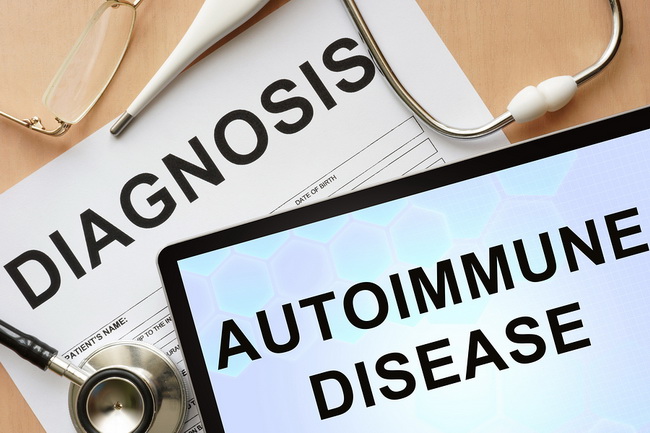- Make It Yourself Lavender Heart-Shaped Bath Bombs!
- 20 Things You Never Knew About “Down There”
- 12 Best Foods For Those Suffering From Arthritis Pain
- 12 Personal Hygiene Mistakes Almost Everyone Makes (Mom Never Told You About #4!)
- 15 Medicinal Plants And Herbs From The Cherokee People
- 12 Mind-Blowing Benefits Of Drinking Coconut Water During Pregnancy
- 12 Outstanding Winter Foods That Won’t Fatten You Up Like A Christmas Turkey
Top Warning Signs of Autoimmune Disease and How to Reverse it Naturally

Photo credit: bigstock.com
Have you noticed that autoimmune diseases are out of control in our modern world? It seems as if everyone knows someone who is affected by one of these diseases. In fact, autoimmune diseases are one of the top 10 leading causes of death for women under the age of 65.
If the words “autoimmune disease” only bring to mind HIV/AIDS, that is most likely because of the attention that this disease has received. There are numerous forms including: thyroid diseases, MS (multiple sclerosis), lupus, rheumatoid arthritis, Graves diseases, psoriasis, celiac disease, and pernicious anemia, just to name a few. These disorders cause various symptoms and can range from mild to severe.
What is the cause of autoimmune disease? There is no one answer for this condition. Many factors can cause a person to develop an autoimmune disorder, and one of them is genetics. But why some genes get turned on for some people, while others do not, remains a mystery.
Some of the main causes, however, are man-made in nature. Heavy metal toxins, such as mercury, or toxins from mold, Candida, the herpes simplex virus, Epstein-Barr virus, and chronic inflammation in the body, especially those caused by a gluten intolerance, all seem to play a role.
If you are experiencing any of the symptoms listed below, you would be wise to first have a hair tissue mineral analysis to test for heavy metal toxicity in your bod. These studies can show if you have high levels of lead, mercury, or cadmium in your system. These metals have been associated in studies to be the root cause of some of the worst autoimmune diseases including lupus, chronic fatigue syndrome, MS, and scleroderma.
Do any of the following symptoms sound familiar? They are all symptoms of various autoimmune diseases:
- Muscle and/or Joint Pain – Aching, burning, or soreness in muscles or joints that you cannot explain; this symptom is common for anyone with an autoimmune disease.
- Swollen Lymph Nodes – We have these all over our bodies, but the most common places to experience swelling is under the jaw, under the arms, and in the groin area, where the legs meet the torso.
- Extreme and Chronic Fatigue – This isn’t the kind of fatigue you have after a hard day, but the kind of fatigue that, after sleeping for12 hours, you wake up and still feel exhausted. If sleep does not make you feel rested, you might have an autoimmune disease.
- Unexplained Weight Gain or Loss – If your diet or exercise hasn’t really changed but you weight changes, either up or down, more than 5 to 7 pounds, this is generally a sign of an autoimmune disease.
- Severe Allergies – Does it seem as if you are allergic to everything? Not just pollen, but most foods, perfume, chemical smells, such as cleaners, animals, plants, and/or dust? Many persons with autoimmune disorders have extreme or numerous allergies.
- Digestive Problems – Unexplained digestive problems such as excessive gas and bloating (so much so your stomach is visibly distended), cramps, constipation or constant diarrhea, and abdominal pain might mean you have an autoimmune disease.
- Brain Fog – If you find it difficult to concentrate, and feel as if your brain is in a fog, this is another common symptom.
- Headaches – Reoccurring headaches, severe headaches, sometimes even migraines, can be a sign of an autoimmune disorder.
- Low Grade Fevers – Recurrent low grade fevers are very common, with many people experiencing these 4 to 6 days each week.
- Inability to Carry Pregnancy to Term – If you have had reoccurring miscarriages, you might have an autoimmune disorder.
- Muscle Weakness – A weakness in the muscles, especially involving the hand or thigh is a common symptom.
- Low Blood Sugar – This is often a sign of adrenal fatigue, which is quite common in those with autoimmune disorders.
If you have, or believe you might have, an autoimmune disorder, your doctor might tell you that there is very little you can do about it other than to treat the symptoms with chemical prescription drugs.
Continue to Page 2

Photo credit: bigstock.com
Well, the last thing you need is to dump more chemicals into your body. You can fight this condition naturally.
1. Look for Triggers
Autoimmune disorders means that your body is sending out an inappropriate response, brought about by some trigger. Most times, the body is going overboard trying to attack something that is not a threat, other times it doesn’t recognize a threat when it should. If you can identify the trigger, what set the immune off, and then you can hopefully avoid, or at least limit, this trigger. Common triggers are:
- Food – Certain foods such as gluten, dairy, high sodium, or processed foods, artificial flavors and food dyes are common triggers.
- Environmental – These are harder to identify, but common triggers are airborne chemicals such as from plastics, varnish, or paint, chemicals found in cleaners, heavy metal ingestion, or even synthetic perfumes, such as those found in laundry detergent and shampoo.
- Airborne – Anything you can smell can be a trigger; pollen, dust, dust mites, pet dander, fur, feathers, gas fumes, and/or air pollution.
It might be difficult to find the source, but if you start eliminating things, over time you should find a culprit or two.
SEE ALSO: 15 of the Best Anti-Inflammatory Herbs and Spices on the Planet
2. Vitamin Deficiency
Many doctors believe that vitamin deficiency can be the cause of autoimmune disorders or that they can help to relive symptoms. Be sure that you are consuming plenty of the following vitamins or that you are taking a high quality supplement:
- Vitamin C – Vital for the proper functioning of the immune system. Consume a minimum of 1,500mg of vitamin C every day to support the immune system.
- Fish Oil – The omega-3 fatty acids in fish oil reduce inflammation in the body, which can lessen an immune response.
- Vitamin D – This one vitamin influences more than 200 genes in the body, one of which is help your body fight infection, reduce inflammation, and often helps those with autoimmune diseases. Try to get plenty of safe sunlight, working yourself up to 30 to 40 minutes of sun exposure each day. If this isn’t possible, take a good quality vitamin D supplement. Many doctors believe that the current RDA is too low. 5,000mg of vitamin D each day is good base if you cannot get much natural sunlight.
3. Peony Root
Peony glucosides come from the root of peony flowers and, unlike many of the prescription drugs that come with terrible and dangerous side effects, the extracts from this root have been shown to suppress excessive immune function and improving immune agents that have a more calming effect. The extract from this common plant has been shown to be quite effective in treating the symptoms from an autoimmune disorder and helping to bring the system back to a more moderate response. You can find peony root extract in most health food stores.
As always, eating an organic, plant based diet, in combination with plenty of fresh air, exercise, and a regular sleep pattern, can help your body recover on its own.
































